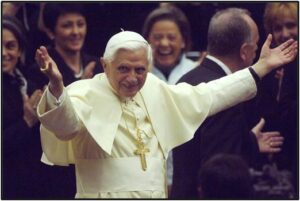 The subject at hand is extremely controversial, and the ramifications of such an article will no doubt cause me open contempt, disrespect, and possibly the label of ‘heretic.’ Despite this, I cannot stay silent. It is necessary, yea vital, to present readers with a biblical perspective on the role and authority of the Pastor, especially in light of an increase in what can only be described as pastoral abuse.
The subject at hand is extremely controversial, and the ramifications of such an article will no doubt cause me open contempt, disrespect, and possibly the label of ‘heretic.’ Despite this, I cannot stay silent. It is necessary, yea vital, to present readers with a biblical perspective on the role and authority of the Pastor, especially in light of an increase in what can only be described as pastoral abuse.
The Roman Catholic religion has long been known for its ability to manipulate its members through fear and threats, allowing those in leadership to effectively control the people and their commitment to the cause. The power associated with the pope is beyond belief. Masses submit to his every wish, convinced that to disobey or even disagree, is to fight against God Himself. A similar ploy has entered into some conservative churches of our land. In these settings, the pastor will exalt himself to a place of power and inerrancy, demanding the allegiance of his people instead of turning their hearts toward God and promoting His sovereignty and authority.
All Men are Sinners
It does not matter how ‘good’ your pastor or church leadership may appear; all have sinned. There are pastors today who act as if they have reached the state of sinless perfection, and therefore represent the perfect example of holiness and wisdom. This is simply not true.
The shepherd does not gain some special entrance into the presence of God; He comes before the same throne of grace as all believers, and through the same person – Jesus Christ. He may preach from an elevated platform on Sunday but that is not an indication of spiritual superiority in God’s hierarchy. Pastors who seek the praise and accolades of men are not fit to fulfil the shepherd’s role. Surely a man who is perpetually broken over his sin and who has an understanding of the holiness of God, is the only suitable candidate for leading and shepherding God’s people.
‘…there is none that doeth good, no, not one.’ Psalm 14:3
‘Who can say, I have made my heart clean, I am pure from my sin?’ Prov.20:9
The Church is Christ’s
‘…Christ is the head of the church: and is the Saviour of the body.’ Ephesians 5:23
‘And He [Christ] is before all things, and by Him all things consist. And He is the head of the body, the church…’ Colossians 1:17-18
‘And hath put all things under His feet, and gave Him to be the head over all things to the church.’ Ephesians 1:22
If Scriptures were not so clear on this subject, I might be confused about who has the ultimate ownership and rule of the church. The way some pastors enthrone themselves, establishing non-biblical standards, and assuming the role of ‘Pope for the people,’ is appalling, and is in total opposition to the clearly outlined role of the shepherd in the Bible. To assume a role of authority in Christ’s church that has not been given by God, is theft. If I instruct my congregation to obey standards and practices that God has not commanded, I become the ‘master of God’s people,’ and in turn teach them to follow me instead of the Lord.
It is the Message, not the Man
‘Remember them that have the rule over you, who have spoken unto you the Word of God: whose faith follow, considering the end of their conversation.’ Hebrews 13:7
Commenting on the above verse, John Gill writes: “Christ’s church is a kingdom, and He is King in it; pastors of churches are subordinate governors; who rule well when they rule not in an arbitrary way, according to their own wills, but according to the laws of Christ, with all faithfulness, prudence and diligence.”
The pastor, like you and I, is a man saved by grace. He has not been imbued with some special ability (albeit there are gifts dispensed by the Holy Spirit which differ – Romans 12:6), nor does he have some supernatural power over men which is of his own energy.
The shepherd finds his authority solely in the Word of God. His counselling and preaching must be grounded in the Scriptures if he is to serve in the way that God has called him to. The pastor is a man who is to be given to prayer and the studying of the Word. I know pastors who busy themselves with all the tangible and temporal aspects of church life when they ought to be focusing on the spiritual and eternal matters at hand. The first and most important job of the faithful shepherd is to preach the Word . He is to passionately pursue God, thereby leaving an example for his people. The following ought to form the pastor’s chief ambition and desire:
‘He must increase, but I must decrease.’ John 3:30
The Pastor will fail you
Nobody is exempt from the effects of sin. One of the great dilemmas in church today is the expectation on the pastor to do everything right. If the congregation is not careful to remember that the shepherd is only a man, they will inevitably and subconsciously elevate him to a place of ‘perfection.’ This will be the great downfall of that church and will result in heartache and discouragement when it is found out that the pastor cannot meet those impossible expectations. This does not give license to the pastor to live as he pleases, but it does remove from him the unattainable standard of perfection. A humble and honest leader will acknowledge his own inability to perform his God given role, and will openly admit that he is the chief of sinners, and unworthy of such a responsibility.
‘It is better to trust in the Lord than to put confidence in man.’ Psalm 118:8
‘Thus saith the Lord; cursed be the man that trusteth in man, and maketh flesh his arm, and whose heart departeth from the Lord.’ Jeremiah 17:5

 The pastor is a man at best;
The pastor is a man at best; THE SCENE:
THE SCENE: Introduction:
Introduction: